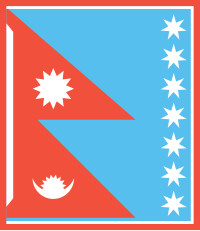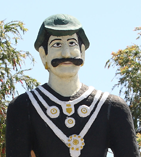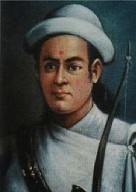Family of Amar Singh Thapa
| Family of Amar Singh Thapa (Elder) | |
|---|---|
 Nishankalika flag of Bagale Thapa clan, Amar Singh’s ancestral clan | |
| Current region | Gorkha & Kathmandu |
| Earlier spellings | Bagale Thapa |
| Place of origin | Siranchowk, Gorkha |
| Members |
|
| Connected members | |
| Connected families | Kunwar family |
| Traditions | Kshatriya (Chhetri) |
| Estate(s) | Siranchowk of Gorkha |
Bagh Bhim Singh Thapa was the first national military commander of this family. | |
The family of Badakaji Amar Singh Thapa[note 1] (1751 - 1816) was a noble Chhetri family in the central politics of Kingdom of Nepal as well as former military aristocracy of Gorkha Kingdom. The family of Bhimsen Thapa and the family of Amar Singh Thapa were two Bagale Thapa families[1][2] and part of larger Thapa caucus at the central politics of the Kingdom of Nepal.[3]
The patriarch of this family is Ranjai Thapa of Siranchowk whose son Bagh Bhim Singh Thapa became a military commander of Gorkha Kingdom and died in the battle of Palanchowk. Bhim Singh's son and the most prominent member of this family, Amar Singh Thapa went on to become overall commander (in capacity of Mukhtiyar) of Kumaon, Garhwal and its West region in the Kingdom of Nepal. Amar Singh's sons and grandsons were influential Bharadars (state-bearing officers), politicians, ministers and military commanders in the Kingdom of Nepal. The family was also maritally connected with Kunwar family of Gorkha. Amar Singh Thapa was the father-in-law of Chandrabir Kunwar, the nephew of Gorkhali Sardar Ramakrishna Kunwar. Through Chandrabir, Amar Singh had grandsons of national recognition; Balbhadra Kunwar, a famed warrior of the Battle of Nalapani and Birbhadra Kunwar, a Bharadar (state bearing officer).
Significance[]

This family was the another influential Bagale Thapa family serving in the royal court with Bhimsen Thapa family, due to their consolidation of power in the central authority.[4] Bhimsen Thapa, also a member of Bagale Thapa clan,[5] added the sons of Amar Singh Thapa in the royal court to increase the influence of Thapa caucus.[3]
Immediate family[]
Children[]
Bada Amar Singh had ten sons from four wives as per the Thapa genealogy: Ranabir, Ranasur, Ranadhoj, Ranabhim, Ranajor, Bhaktabir, Ramdas, Narsingh, Arjun Singh, and Bhupal Singh.[6] The Office of the Nepal Antiquary also mentions sons of Amar Singh as Ranajor, Bhaktavir, Ramdas, Ranasur, Ranabir, Arjun, Narsingh and Bhupal.[7] The genealogical table produced by Kumar Pradhan shows the sons of Bada Amar Singh as - Ranadhoj, Bhaktabir, Narsingh, Ramdas and Ranajor, all of whom were Kaji at some point.[8]
Ranadhoj Thapa[]

Ranadhoj Thapa was deputy Prime Minister of Nepal during the administration of Prime Minister Bhimsen Thapa.[10] As per Historian Dilli Raman Regmi, he was the eldest son of Bada Kaji Amar Singh Thapa, supreme commander of Western front.[10] He was functioning deputy to Mukhtiyar (Prime Minister) during the well known Anglo-Nepalese war.[9] Mukhtiyar Bhimsen Thapa had to share administrative authority with him.[10] He retired as Kaji of Nepal in the year 1831 A.D.[8]
Ranajor Thapa[]
He was governor of Kumaun and Garhwal and commander of Jaithak Fort during Anglo-Nepalese war at Battle of Jaithak.[11][12] He was born to General Bada Kaji Amar Singh Thapa.[8]
Arjun Singh Thapa[]
Arjun Singh Thapa referred as Arjan Singh was a son of Amar Singh and a military Captain. He took retirement in 1838 and returned to Nepal.[13]
Bhupal Singh Thapa[]
Bhupal Singh Thapa was a son of Amar Singh.[13] In April 1840, Bhupal Singh Thapa who was in command of Nepalese troops at Doti.[14] He was ordered to lead a diplomatic mission to Lahore.[14]
Grandchildren[]
The number of grandchildren of Amar Singh is unknown. However, some of his grandsons were prominent in Nepalese politics, administration and military commandership. His grandson through Ranadhoj Thapa were Ripu Mardan Thapa and Badal Singh Thapa, who also served as Kaji of Nepal.[8] His another grandson, Surat Singh Thapa, was appointed to post of Kaji in 1832 A.D. to retaliate growing Darbar politics after which he became joint-chief signatory in each government papers with Mukhtiyar Bhimsen Thapa.[15][8] His grandsons through daughter Ambika Devi and son-in-law Chandravir Kunwar were influential Bharadars too. Balabhadra Kunwar, son of Chandravir and hero of the Battle of Nalapani, was a grandson of Amar Singh.[16] Similarly, Birbhadra Kunwar, a military commander in Kumaun, was also grandson of Amar Singh through Chandravir.[17]
Ripu Mardan Thapa[]
Ripu Mardan Thapa was a commander of Anglo-Nepalese war at Battle of Nalapani. He fought alongside his cousin Balbhadra Kunwar, another grandson of Bada Amar Singh.[18] He sustained an injury in his right arm from an enemy shell.[19] He was later appointed as Commander of a military company in Bhirkot. [20]
Balbhadra Kunwar[]

Balbhadra Kunwar (30 January 1789 – 13 March 1823) was a Nepalese military commander who popularly led the Battle of Nalapani.[21] Balabhadra Kunwar was highly praised for his military skill for the defence of the Nalapani fort.[22]
Birbhadra Kunwar[]
Birbhadra Kunwar was military commander in Kumaun[17] and Kangra front (1809 A.D.)[23] as well as governor of Garhwal.[24]
Ancestry[]

He was a member of Bagale Thapa clan.[2]
Parents[]
Amar Singh's father Bhim Sen,[8] also known as Umrao Bagh Bhim Singh Thapa was a military commander who died in the battle of Palanchowk in 1759 AD.[2][25] He is also known as Tiger of Siranchowk.[25] His mother as per the Thapa genealogy is Uma Devi.
Grandparents[]
Amar Singh was grandson of Ranjai [of Sirhanchowk].[8]
Genealogical table[]
The Thapa genealogy mentions following ancestors of Amar Singh:[6]
| 16. Anirudra Thapa | |||||||||||||||||||
| 8. Dhanjai Thapa | |||||||||||||||||||
| 4. Ranjai Thapa | |||||||||||||||||||
| 2. Bhim Singh Thapa | |||||||||||||||||||
| 1. Amar Singh Thapa | |||||||||||||||||||
| 3. Uma Devi | |||||||||||||||||||
Other relatives[]
Chandrabir Kunwar[]
Chandrabir Kunwar married a sister of Kaji Ranajor Thapa[18] and was a son-in-law of Bada Amar Singh Thapa[17][23] Chandra Bir was appointed as Subba (i.e. governor) of Pyuthan in around 1844/45 Vikram Samvat.,[22] governor of hill, Madhesh and Bhot divisions of Doti region 1864 V.S.[26] and Subba (governor) of one-third territories of Garhwal[24] on 1862 Vikram Samvat.[27][28]
Later Descendants[]
Jharana Thapa, a popular Nepalese actress is married to Sunil Thapa, an eighth patrilineal descendant of Bada Kaji Amar making their daughter Suhana Thapa ninth descendant.[29]
References[]
Footnote[]
- ^ Not to be confused with the Amar Singh Thapa (born 1759).
Notes[]
- ^ Pradhan 2012, p. 22.
- ^ Jump up to: a b c Hamal 1995, p. 191.
- ^ Jump up to: a b Pradhan 2012, p. 26.
- ^ Whelpton 1991, p. [page needed].
- ^ Whelpton 1991, p. 21.
- ^ Jump up to: a b https://issuu.com/laxmanthapa/docs/bagale
- ^ ONA 1978.
- ^ Jump up to: a b c d e f g Pradhan 2012, p. 195.
- ^ Jump up to: a b "Cover with the seal of Amar Singh Thapa". Bilder-aus-nepal.de. Retrieved 1 November 2017.
- ^ Jump up to: a b c Regmi 1975, p. 178.
- ^ Singh 2013, p. 64.
- ^ Prinsep 1825, p. 94.
- ^ Jump up to: a b Gupta 1978, p. 380.
- ^ Jump up to: a b SGPI 1988, p. 54.
- ^ Pradhan 2012, p. 148.
- ^ Acharya 1971, pp. 3–5.
- ^ Jump up to: a b c Dabaral 1987, p. 51.
- ^ Jump up to: a b Acharya 1971, p. 3.
- ^ Pant 1978, p. 188.
- ^ Pant 1978, p. 193.
- ^ http://kathmandupost.ekantipur.com/printedition/news/2012-01-31/bulbudder-and-the-british.html
- ^ Jump up to: a b Acharya 1971, p. 5.
- ^ Jump up to: a b Regmi 1987b, p. 150.
- ^ Jump up to: a b Regmi 1988a, p. 46.
- ^ Jump up to: a b Acharya 1972, p. 145.
- ^ Regmi 1986c, p. 185.
- ^ Regmi 1987a, p. 48.
- ^ Pauw 1971, p. 47.
- ^ "ampnews/2013-12-15/6239". nepal.ekantipur.com. Retrieved 2017-06-11.
Sources[]
- Books
- Acharya, Baburam (January 1, 1971) [1950]. "King Girban's Letter To Kaji Ranjor Thapa" (PDF). Regmi Research Series. 3 (1): 3–5.
- Gupta, Hari (1978). History of the Sikhs: Evolution of Sikh confederacies, 1708-1769 (3rd rev. ed.). the University of Virginia: Munshiram Manoharlal.
- Hamal, Lakshman B. (1995). Military history of Nepal. Sharda Pustak Mandir. p. 125. OCLC 32779233.
- Office of the Nepal Antiquary (ONA) (1978). Nepal Antiquary. 5. Office of the Nepal Antiquary.
- Pradhan, Kumar L. (2012). Thapa Politics in Nepal: With Special Reference to Bhim Sen Thapa, 1806–1839. New Delhi: Concept Publishing Company. p. 278. ISBN 9788180698132.
- Prinsep, Henry Thoby (1825). History of the Political and Military Transactions in India During the Administration of the Marquess of Hastings, 1813–1823. 1. London: Kingsbury, Parbury & Allen. OCLC 152785969.
- Regmi, D.R. (1975). Modern Nepal. 1. Firma K.L. Mukhopadhyay. ISBN 0883864916.
- Singh, Mahendra Man (2013). Forever Incomplete: The Story of Nepal. SAGE publications India. ISBN 9788132116585.
- Superintendent Government Printing, India (SGPI) (1988). Proceedings of the Session. 52. Superintendent Government Printing, India.
- Whelpton, John (1991). Kings, soldiers, and priests: Nepalese politics and the rise of Jang Bahadur Rana, 1830–1857. Manohar Publications. p. 254. ISBN 9788185425641.
- Journal articles
- Acharya, Baburam (August 1, 1972) [1966]. "The Campaign Of Politicaal Unification" (PDF). Regmi Research Series. 4 (8): 141–145.
- Dabaral, Shiva Prasad ‘’Charan’’ (April 1987). "From the Yamuna to the Sutlej" (PDF). Regmi Research Series. 19 (4): 50–54.
- Pant, Mahesh Raj (1 December 1978). "The Battle of Nalapani" (PDF). Regmi Research Series. Kathmandu. 10 (12): 187–194. ISSN 0034-348X.
- Regmi, Mahesh Chandra (September–October 1987b). "Gorkhali Rule in Garhwal" (PDF). Regmi Research Series. 19 (9–10): 143–150.
- Regmi, Mahesh Chandra (April 1988a). "Miscellaneous Documents of Marga Sudi 1, 1865" (PDF). Regmi Research Series. 20 (4): 46–47.
- Regmi, Mahesh Chandra (December 1, 1986c). "Subba Chandrabir Kanwar of Doti" (PDF). Regmi Research Series. 18 (12): 185–186.
- Regmi, Mahesh Chandra (April 1987a). "Garhwal Appointment, A.D. 1805" (PDF). Regmi Research Series. 19 (4): 46–48.
- Pauw, E.K. (February 1, 1971) [1896]. "Gorkhali Rule in Garhwal" (PDF). Regmi Research Series. 3 (2): 44–50.
- Nepalese military personnel
- People of the Anglo-Nepalese War
- Chhetri noble families
